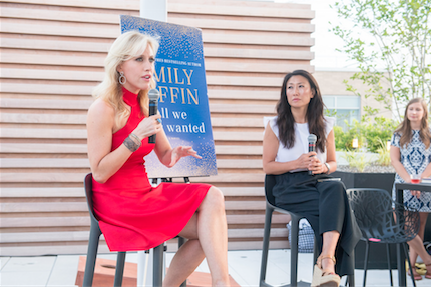Her new novel explores hot-topic social issues and familial struggles.

Emily Giffin discusses her new book “All We Ever Wanted” at her rooftop celebration on June 27 (Photo by Daniel Swartz).
New York Times bestselling author Emily Giffin celebrated the release of her new novel in style with an intimate rooftop gathering at 800 P Apartments. Guests enjoyed music from DJ Alkimist, wine, hors d’oeuvres and panoramic views of D.C. Fans were able to hear from Giffin at a special author talk (moderated by NBC4’s Eun Yang) and Q&A session. We caught up with the author after the event to hear the behind-the-scenes on the writing of “All We Ever Wanted” and to find out why this book is so personal for her.
Washington Life: You are known for your rom-com books, but “All We Ever Wanted” addresses some hot-topic issues. Why did you choose to take a different direction with this book? Who or what inspired you?
Emily Giffin: I didn’t initially set out to write about sexism, racism and classism, but those issues worked their way into the story as I developed the characters and the plot evolved. I started writing “All We Ever Wanted” in the summer of 2016, during the months leading up to the presidential election, and finished it in early 2018. With hindsight, I can see how those themes emerged and seeped into the story. They’ve become such a huge part of our national conversation and definitely influenced this book.
WL: You’ve said this is an “emotional” book for you. Why is that? And was it challenging to write as a result?
EG: The story taps into a lot of my own parental fears. With twin fourteen year-old sons who are beginning high school this year, and an eleven year-old daughter, I worry so much about their well-being and safety—but also their character. Specifically, I have thought a lot about how easy it is to let privilege morph into entitlement, and what that might do to them as they grow older. Writing this book has been a powerful reminder of how important it is to be vigilant when it comes to our values.
WL: Which character in the story do you relate to the most? And why?
EG: I told the story from three points of view, and therefore spent much time in the heads of Nina, Lyla and Tom. Although I have more in common with Nina (a married mother in her forties) than Lyla (a teenager) and Tom (a man), I wouldn’t say I related to her more or less than the other two. In fact, I probably felt the closest to Tom, at least when it comes to the way we view the world.
WL: Has this book marked any type of turning point in your work as an author? (In other words, do you plan to write more books like it in the future?)
EG: Honestly, I don’t think of my writing that way. My priority has always been—and will continue to be—character development. I will always write about relationships, their complexity and messiness, as I don’t think anything is more important in our lives than the people we love. Some issues and themes might be perceived as more “serious” or relevant or timely, but that will never be my priority when it comes to fiction.
WL: What is one thing you hope your readers take away from the book?
EG: Again, I don’t set out to convey messages, but after I finish a novel, they do emerge. I would say for this book, like others before it, I want my readers to ask themselves whether they are living their best, most authentic lives.




